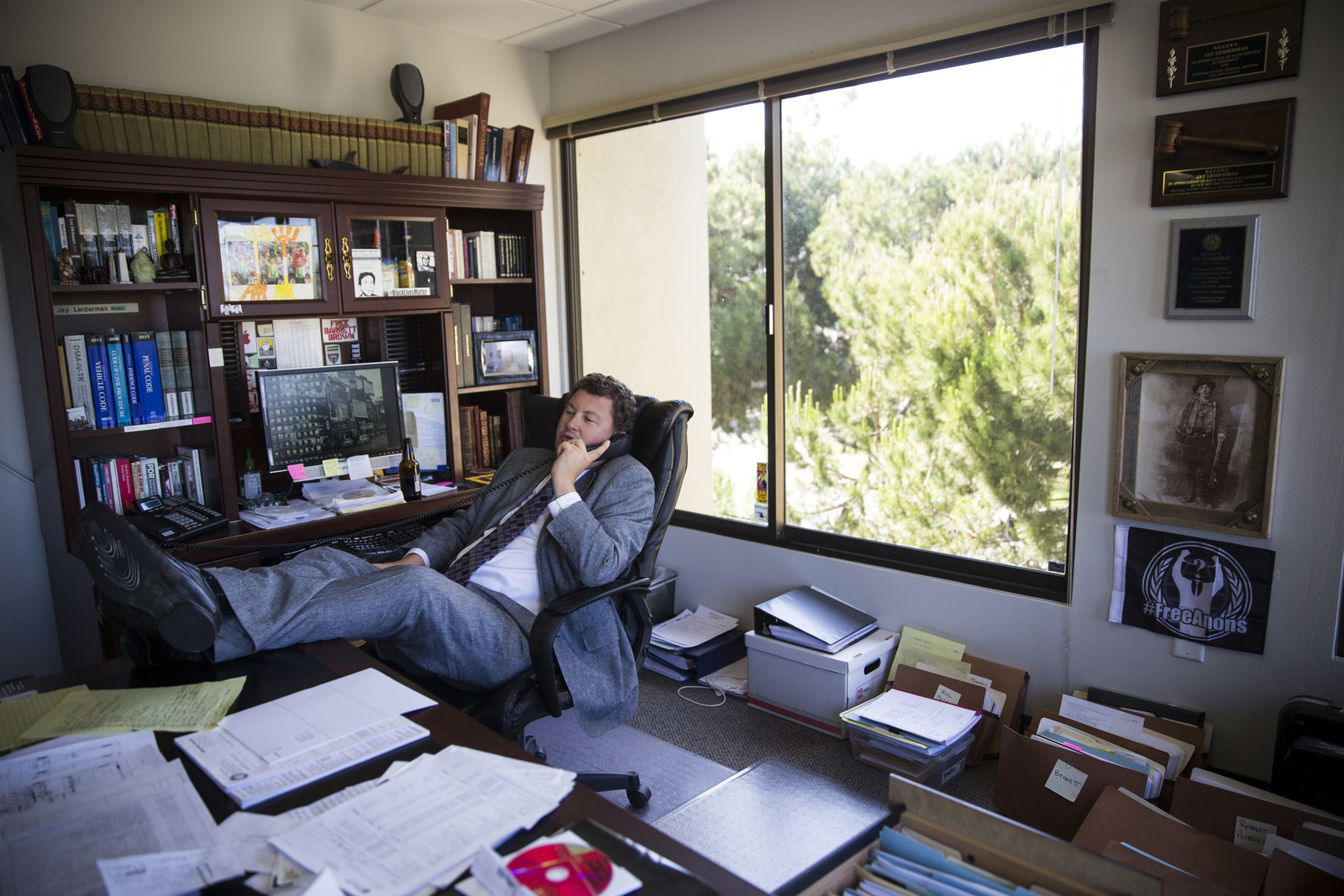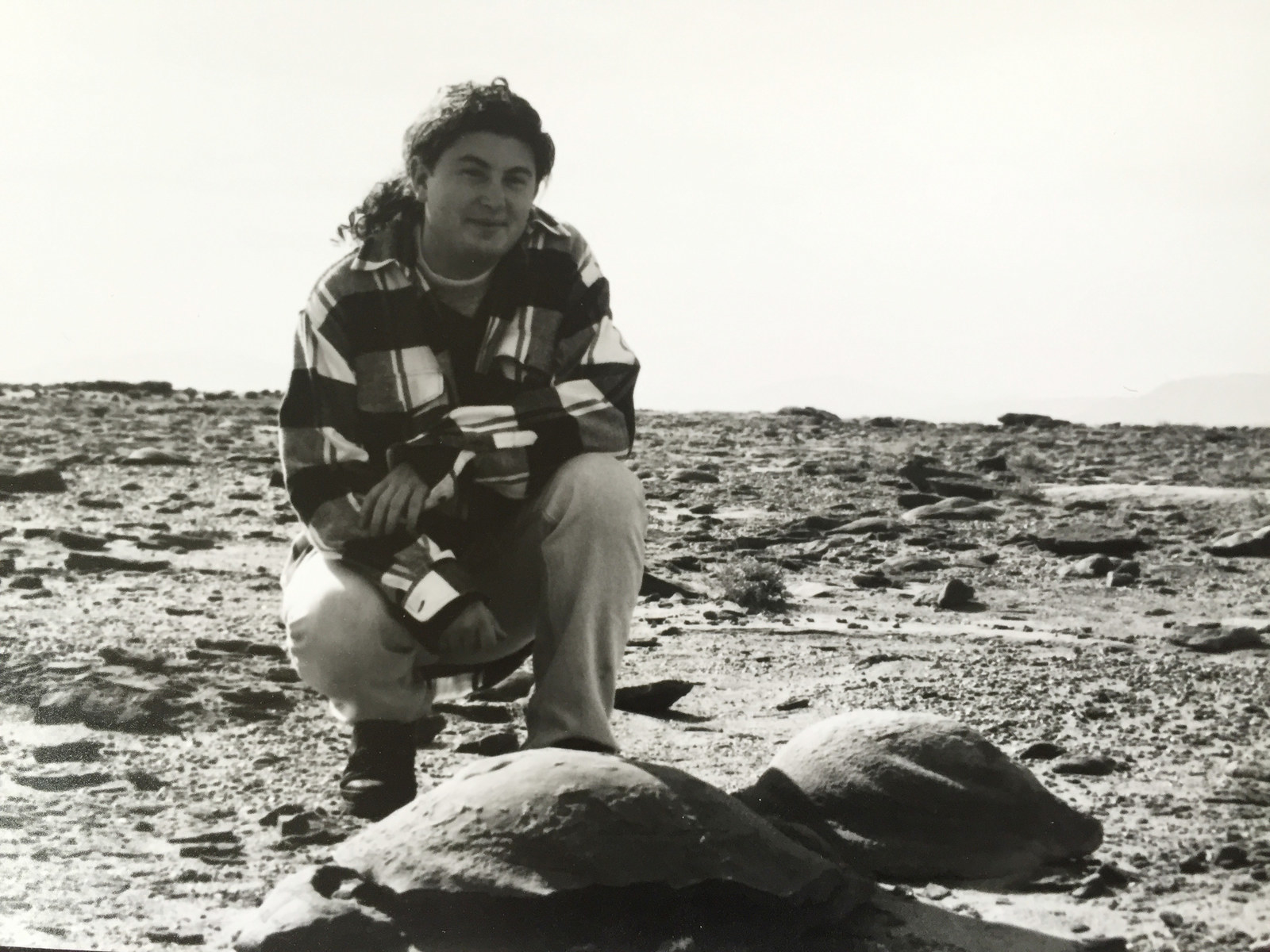The law offices of Jay Leiderman occupy the third floor of a beige building in an unlovely office park across a busy road from a strip mall that features a martial arts studio, a discount tool mart, and a vape shop called “Vapes!” Here in Ventura, California — known variously as “Ventucky,” “Bakersfield by the sea,” and, per one Urban Dictionary entry, “the armpit between Santa Barbara and Malibu” — the locals tend to get charged with crimes like driving under the influence, simple assault, and possession of methamphetamine. It is not exactly a hotbed of hacking, making it a bit of a strange location for an attorney who may be the best-known defender of people accused of computer crimes in the United States.
And yet here comes Jay Leiderman, pulling into a pine-shaded parking lot in a milk-white Maserati Ghibli. Over the past five years, Leiderman has turned himself into one of the central figures in the small world of lawyers who regularly defend hackers. If the Justice Department indicted you tomorrow for doing something on a computer that you shouldn’t have been doing, it’s almost certain that within a few short hours you would hear Leiderman’s name. That might be because he’s already written about your case to his thousands of followers online. It might be because your lawyers need advice themselves. Or it might be because Leiderman is already your lawyer.
The thing is, the Justice Department doesn’t prosecute many people under the Computer Fraud and Abuse Act, the federal statute that governs computer crimes involving “unauthorized access.” The people it does come after are usually young and unable to afford high-quality representation. Consequently, even America’s most prominent defenders of computer criminals don’t defend them all the time, or even most of the time. And when they do, they often work for free, or close. That means, in 2016, it isn’t possible to have a solvent criminal law business solely devoted to defending hackers. And so the vast majority of people who trickle into Leiderman’s practice have nothing to do with the CFAA. Most of them probably have no idea what the CFAA is, or that their criminal defense attorney has an international reputation defending people accused of violating it. Neither, for that matter, do many of Leiderman’s local colleagues. No, one of computer law's loudest voices — the attorney who has represented some of the country’s most famous hackers and who keeps an encrypted chat app open at all times so he can dispense ad hoc pro bono legal advice to members of Anonymous — spends much of his time defending the kinds of clients Matlock might turn down on a good day and keeping Ventura’s marijuana professionals out of trouble. Most days, he can’t even have an IRL conversation about his biggest cases. Which is a shame, because Jay Leiderman really loves to talk.
“Most people coming in here are having the worst day of their life. They don’t need some stuffy asshole who is dead inside.”
One such local client: Michael Bogdan, who arrived at the office unannounced on a recent Monday morning. He walked through reception — past a legal assistant, past twin charcoal portraits of the imprisoned hacker Jeremy Hammond and journalist Barrett Brown, past a framed copy of a Ventura County Star feature identifying Leiderman as “one of the top attorneys in the country for people accused of violating the federal Computer Fraud and Abuse Act,” past several framed pieces of Grateful Dead album art — and into the corner office. Leiderman, having paused a bootleg 1978 live performance of the Rolling Stones’ “Some Girls,” spun in his chair to face his client, a shambolic-looking white man with a dead tooth.
“You’re here?” Leiderman said. “You’re here!”
Bogdan had been calling all morning about a hearing in his case, which was typical of Leiderman’s often bizarre workload. The 39-year-old movie memorabilia dealer had slowly been going blind since 2004 and had recently started paying porn stars for sex, or, as Leiderman put it, “enjoying his sight while he’s still got it.” Last year, after a relationship with one such escort soured — she claims he was harassing her on social media, while he claims to have become enraged after she asked him to pay her to exchange text messages — she took out a restraining order against him that included his writing online. Bogdan hired Leiderman to get that part of the order lifted as a prior restraint on speech. Now Leiderman was trying to work out a deal with her lawyer that would keep them away from each other while still letting Bogdan write about their relationship on his own website, The Porn Star and The Blind Man.
“It’s always something!” Leiderman said,
laughing as he located, with clairvoyant speed, a piece of paper buried on his
anarchic desk.

Details in the office of Jay Leiderman
Nancy Pastor for BuzzFeed News
Bogdan’s was just one of 26 open cases for Leiderman as of early April; other clients included a man accused of drunkenly stealing a dirt bike from the pit of a motocross rally, a teenager who shot up his own house with his father’s gun to distract his parents from the fact that he had missed his curfew, a Hell’s Angel with a gun charge, a man accused of molesting a 10-year-old, and assorted drunken misdemeanors. Also among them were a handful of court appearances he was making on behalf of a friend and former officemate who had not totally unexpectedly killed himself the week before.
And then there was the case of Matthew Keys, the former Reuters social media editor who had been convicted the previous October of conspiring to hack the website of the Los Angeles Times and who faced up to 87 months in prison. His sentencing hearing loomed in two weeks in federal court in Sacramento.
If Leiderman, who is 45, was exhausted or grieving, he didn’t show it. For one thing, such was the slew of tasks at hand that he had taken up coffee just that week, and he was on his second cup of the day. (“I don’t drink coffee!” he said, over a steaming mug, as if he had surprised himself.) For another, his two most salient features, extremely blue eyes and extremely shrewd eyebrows, in combination with his cherubic face, gave Leiderman the aspect of a man perpetually on the verge of a wonderful prank. Also, this was a non-court day, so he dressed all the way down: a black T-shirt screen-printed with the image of a roaring tiger, stonewashed jeans with torn-up knees, and Adidas Sambas. “Most people coming in here are having the worst day of their life,” Leiderman said. “They don’t need some stuffy asshole with gray hair who is dead inside.”
Whatever the reason for the getup, it was most definitely a vibe. Here was an utterly local lawyer costumed as a forgotten John Hughes protagonist; driving an expensive Italian sports car; presiding over an exuberantly disordered office; who was possibly repressing some heavy-duty mourning; who, by the way, had some pretty deep connections with Ventura County’s medicinal cannabis community; who lived basically a double life as counsel to the internet’s undesirables; all the while a bitter john with too much time on his hands hovered weirdly over his desk. There was a slight but unmistakably zany whiff of Saul Goodman in the air.
It was more than enough to make one wonder: How had this guy become the face of criminal defense for hackers in America? And, relatedly: How was this guy going to keep Matthew Keys out of prison?
“Every Monday something always fucking happens!” Leiderman exclaimed, in response to something on his phone, though he did not seem to be complaining.

Leiderman in his office.
Nancy Pastor for BuzzFeed News
On March 18, 2013, a Monday, Jay Leiderman went on HuffPost Live to discuss his newest client, Matthew Keys. Keys had been indicted the previous Thursday by the U.S. government, which alleged that he had passed login credentials to members of Anonymous in an internet chat and encouraged members of the hacking collective to deface websites owned by the Tribune Company, his former employer, against which he had a grudge. According to the indictment, an Anonymous member named “Sharpie” had used that information, at Keys’ bidding, to change the headline of a Los Angeles Times article to “Pressure builds in House to elect CHIPPY 1337,” a reference to a hacking group. The defacement was live for about 40 minutes.
In the dazed hours after the indictment, Keys received an email from Tor Ekeland, probably America’s other best-known CFAA defense attorney, whose client, the hacker Andrew “weev” Auernheimer, told him to take the case. But Ekeland wasn’t licensed in California, so he had to find someone to take the case with him, pro bono. His first thought was Jay Leiderman, whom he knew by reputation. (It helps when you are only one of a few lawyers who does what you do.) In Leiderman, Ekeland found a “street-smart trial lawyer” who was “extraordinarily quick on his feet.”

Nancy Pastor for BuzzFeed News
On HuffPost Live, Leiderman had a lot to say about Matthew Keys. If his client had wanted to get back at his former employer, he would be facing less jail time if he had “beat him with a baseball bat” and “spray-painted all the computers and walls of the Los Angeles Times,” and so didn’t you have to ask yourself, “Is our government incentivizing physical violence?” Also, if his client had even been in that internet chat, he had been there as “sort of an undercover-type, investigative-journalism thing.” Also, come on, what his client had been accused of doing was totally not that big of a deal.
“No one was hurt, there were no lasting injuries, no one's identity was stolen, lives weren't ruined,” Leiderman had told the Associated Press. “It was a joke, and I guess a joke will get you 25 years in prison.”
Leiderman was far from alone in making this argument. The CFAA, introduced in 1984 and expanded in 1986, is widely loathed among internet activists, security researchers, and many lawyers in the field, who see the law as an “egregiously overbroad” relic that has led to a chilling effect on legitimate work, and that protects the rights of powerful corporations and government agencies while endangering ordinary web users.
In particular, the central phrases in the law, which forbid “unauthorized access” of a “protected computer,” can be interpreted so widely as to include behavior as mundane as password sharing. Worse still, the law carries exorbitant statutory maximum sentences; Keys was looking at a maximum prison term of 25 years. That's partially because the CFAA is subject to the “Economic Offenses” subsection of the Federal Sentencing Guidelines, which adds “offense levels” in proportion to the monetary loss incurred by the crime. In a forthcoming paper in the George Washington University Law Review, the computer law scholar Orin Kerr argues that CFAA offenses should be considered crimes of trespass, not fraud, and that loss should be a secondary factor in calculating sentences. The law professor and media scholar Tim Wu has called the CFAA “the worst law in technology.”
“It was a joke, and I guess a joke will get you 25 years in prison.”
The January before Keys was indicted, Aaron Swartz, a 26-year-old programmer and activist, hanged himself in his Brooklyn apartment in the face of 35 years in prison. He had been indicted in 2011 under the CFAA after downloading millions of articles from JSTOR, an archive of academic journals. Even before his death, Swartz was an internet folk hero: He co-founded Reddit and co-developed RSS. His alleged crimes were high-minded, or at least principled — he had long been an advocate for democratizing access to information. Swartz’s indictment had given anti-CFAA advocates a powerful symbol of the way the law can crush good people and good work; his suicide robbed them of a plaintiff who could have helped make a profound case against the law in court.
The CFAA-amending Aaron’s Law Act, named for Swartz, has been introduced in Congress twice but has never come up for a vote. Among the reasons why CFAA reform has moved so slowly may be the fact that the mandatory maximums, while alarming, are almost never applied, and that there simply are not very many CFAA prosecutions, full stop. According to Kerr, the federal government brings about 100 CFAA prosecutions a year. That’s because CFAA violations are extraordinarily difficult to find and prove.
Indeed, the government tends to prosecute CFAA cases only when it has a strong chance of securing a conviction, as it did against Keys, who had confessed to the crime in a taped interview with an FBI agent — a confession Keys said he gave while whacked out on prescription pills. This puts attorneys like Leiderman in a strange situation: How can you argue simultaneously that your client is innocent and that taking your client to court for the not-very-harmful thing that your client kind-of-maybe-probably did is wild prosecutorial overreach?
The government offered Keys a plea deal, which, according to Keys, did not rule out the possibility of a short prison sentence. He rejected it. That meant it was up to Leiderman and Ekeland to take apart the government’s case that Keys did it. And failing that, to take apart the law that made what he kind-of-maybe-probably did a crime.

Jay Leiderman in his youth.
Courtesy Jay Leiderman
Though everyone in Jay Leiderman’s family told him he should be a lawyer, it took Jerry Garcia to truly convince him.
Born in Queens in 1971 to a toy executive and a sixth-grade teacher, Leiderman grew up in upper-middle-class Rockland County, about an hour's drive north of the city. The highlights of his early childhood revolved around a yearly trip with his father to Toy Fair, the annual industry convention, which he left one year with a box full of Star Wars figurines and another year with a photo beside Lee Majors, the Six Million Dollar Man. (That one sits on a bookshelf in his office.) In high school, he nursed two obsessions, both musical: punk rock and the Grateful Dead. That meant dozens of shows at CBGB in the mid- to late 1980s. It also meant, after the Dead burst through to a new generation of ears on the strength of 1987’s “Touch of Grey,” the beginning of a lifelong fandom.
“I’ve seen them, I would guess, exactly 164 times,” Leiderman said.
The law professor and media scholar Tim Wu has called the CFAA “the worst law in technology.”
After graduating Michigan in 1993, Leiderman and his friends loaded up a “roadworthy” blue Volvo station wagon with camping equipment and set out to follow the group across the country, full-time. There they joined thousands of other Deadheads hawking everything from burritos and blown glass to nitrous oxide and tie-dye to fund their travel. A friend made frequent trips to Nepal, where he bought and brought back T-shirts that the group flipped for an $8 profit on every shirt. Outside shows, Leiderman would stand on a blue tarp, shirtless, wearing denim cutoffs, a fanny pack, and Birkenstocks, with dozens of the shirts spread out before him. The group made enough money to live and travel, staying 12 people in a hotel room. The ride lasted for two blissful years. Along the way, Leiderman soaked up the group’s post-’60s ethos of personal and political freedom.
“We were so on our own. We weren’t bound by any conventional rules. We felt that we were America’s last tribe,” he said.
Then, on August 9, 1995, Jerry Garcia died of a heart attack in his room at the Serenity Knolls treatment center. The Dead disbanded. The organizing force of Leiderman’s life was suddenly gone.
“My whole life changed,” Leiderman said. “Everyone I knew, all my friends, were all in flux. Were we going to scatter to the four winds? Ultimately, people did.”
But Leiderman remembered something his grandfather had told him: If he wanted to turn his idealistic streak into social change, he had to work from inside the system. Plus, his parents had always told him that he would make a good lawyer. Plus, “I didn’t know what the hell I was doing,” Leiderman said. So, the weekend after Garcia died, Leiderman began his law school applications. He showed up for classes at the University of San Francisco Law School the following summer with hair halfway down his back, and left in 1999 as the class president. He applied to public defender jobs around the country, and picked Ventura because of the weather. He thought he’d stay 10 months.

Jay Leiderman and his wife, right, at Victoria's with a group of friends.
Nancy Pastor for BuzzFeed News
from BuzzFeed - Tech https://www.buzzfeed.com/josephbernstein/meet-the-maserati-driving-deadhead-lawyer-who-stands-between?utm_term=4ldqpia
No comments:
Post a Comment